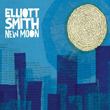 With New Moon, the late, lamented Elliott Smith gets a fitting and evocative send-off in this collection of early, unreleased session material from the (unfortunately named) Kill Rock Stars label. Elliott Smith surely ranks among the most tragic of recent indie-rock stars. An alt-folk singer/songwriter out of Portland, Oregon, he was catapulted to fame in 1997 when legendary director Gus Van Sant tapped him to contribute to the soundtrack of Good Will Hunting, and Smith’s “Miss Misery” was nominated for an Oscar. But that success and his jump to major label DreamWorks were not enough to overcome depression and serious substance abuse problems. After hitting his nadir in 2001-2002 while recording From a Basement On a Hill, Smith seemed to turn things around, but ended up committing suicide six months later. Basement was posthumously released in 2004, but between his poor psychological state when making the record, and his family’s desire to do little post-production work (other than removing the darkest numbers), Basement left many fans with not quite the sonic legacy they’d hoped for.
With New Moon, the late, lamented Elliott Smith gets a fitting and evocative send-off in this collection of early, unreleased session material from the (unfortunately named) Kill Rock Stars label. Elliott Smith surely ranks among the most tragic of recent indie-rock stars. An alt-folk singer/songwriter out of Portland, Oregon, he was catapulted to fame in 1997 when legendary director Gus Van Sant tapped him to contribute to the soundtrack of Good Will Hunting, and Smith’s “Miss Misery” was nominated for an Oscar. But that success and his jump to major label DreamWorks were not enough to overcome depression and serious substance abuse problems. After hitting his nadir in 2001-2002 while recording From a Basement On a Hill, Smith seemed to turn things around, but ended up committing suicide six months later. Basement was posthumously released in 2004, but between his poor psychological state when making the record, and his family’s desire to do little post-production work (other than removing the darkest numbers), Basement left many fans with not quite the sonic legacy they’d hoped for.
For them, and music fans in general, New Moon is a much more apt coda to Smith’s career. Compiled by his original indie label, Olympia, Washington’s Kill Rock Stars, it is a collection of 1995-1997 session material – i.e., pre-“Miss Misery” – but is mostly original songs that would never appear on later releases. With little extra added to the outtakes, they remain largely just stripped-down, vocals-and-acoustic-guitar pieces, and the lack of nearly any effects wonderfully let Smith’s voice and melody shine through. Incredibly, even with the general same limited instrumentation on all twenty-four tracks, New Moon rarely feels repetitive, or the songs sloshed together.
Most of the material on New Moon comes from recording sessions for either 1995’s Elliott Smith or 1997’s Either/Or, and the collection displays different sides to Smith’s music, each unique and interesting. The pretty numbers might actually be the least rewarding, as they mostly lack in true remarkableness. But there are exceptions, in the three tracks on the record that actually were later recorded and released: an early, stripped-down version of “Miss Misery”, a cover of Big Star’s power-pop “Thirteen” (later to be done for the Thumbsucker soundtrack), and the sweet “Pretty Mary K (Other Version)” (its title was used for an entirely different song on 2000’s Figure 8, while the song itself became “Everybody’s Okay”, an unofficially released outtake from the Basement sessions).
The first songs that might strike the listener are the fun tunes, which are a wonderful antithesis to Smith’s tragedy. Late in New Moon are the three successive tracks “Seen How Things Are Hard”, “Fear City”, and “Either/Or” (all, unsurprisingly, from the Either/Or sessions). Each are excellent, and each are also fun, though in different ways, with “Seen” relying on a winning road style, “Fear” marrying a great beat and chorus to wry lyrics, and “Either/Or” just purely enjoyable and catchy. And the first piece from the Either/Or sessions, “New Monkey”, has a knowing wit that makes it feel almost like an ironic Gen X version of The Beatles’ “Everybody’s Got Something to Hide Except for Me and My Monkey”.
While Smith always claimed The Fab Four were his greatest inspiration, on New Moon one can also hear the influence of another sixties act, Simon & Garfunkel. There are a number of pieces on New Moon that are echoing, yet not trying to haunt, and sad, yet not going for melancholy; similar to early Simon & Garfunkel work like “The Sound of Silence” or “Scarborough Fair”. In some ways the most remarkable discovery on the album, such fine tracks as “Going Nowhere”, “Georgia, Georgia”, and “Whatever (Folk Song In C)” create a sonic landscape of sadness that is never overwrought. The Either/Or outtake “Nowhere” is the most straightforward, while Elliott Smith outtakes “Georgia” and “Whatever” show a more pressing, and more low-key, side, respectively.
There are other musical journeys on New Moon, like the actually haunting “High Times”, the subversively drunk “Riot Coming”, and the touching bass of “See You Later”. And there are the particularly driving numbers, with tempos far quicker than the rest of the record, like the pushing “Big Decision” and the more harmonious “Almost Over”.
Any posthumous release for a star who died too young, and far too tragically, can be a very tricky thing. From a Basement On a Hill may have simply tried to serve too many causes at once, from finishing a half-finished record to delivering a bright rejoinder to the sad circumstances of Smith’s death. New Moon luckily benefits from low expectations: it’s only early outtakes, with little remastering, comes years after his death, etc. From that base, the album blows the roof off with its quality, diversity, and power. What’s more, even taken on its own, and heard by someone who knows nothing of Elliott Smith’s music or life story, New Moon is a very good record.



















